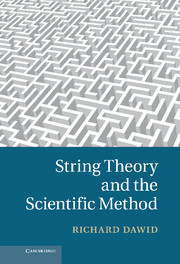Description
String Theory and the Scientific Method
Author: Dawid Richard
This book explains why string theorists develop a strong belief in their theory despite the lack of empirical confirmation.
Language: English
Subject for String Theory and the Scientific Method:
Approximative price 31.44 €
In Print (Delivery period: 14 days).
Add to cart
String Theory and the Scientific Method
Publication date: 12-2014
212 p. · 15.2x22.8 cm · Paperback
Publication date: 12-2014
212 p. · 15.2x22.8 cm · Paperback
Approximative price 135.96 €
In Print (Delivery period: 14 days).
Add to cart
String Theory and the Scientific Method
Publication date: 05-2013
214 p. · 15.5x23.1 cm · Hardback
Publication date: 05-2013
214 p. · 15.5x23.1 cm · Hardback
Description
/li>Contents
/li>Biography
/li>
String theory has played a highly influential role in theoretical physics for nearly three decades and has substantially altered our view of the elementary building principles of the Universe. However, the theory remains empirically unconfirmed, and is expected to remain so for the foreseeable future. So why do string theorists have such a strong belief in their theory? This book explores this question, offering a novel insight into the nature of theory assessment itself. Dawid approaches the topic from a unique position, having extensive experience in both philosophy and high-energy physics. He argues that string theory is just the most conspicuous example of a number of theories in high-energy physics where non-empirical theory assessment has an important part to play. Aimed at physicists and philosophers of science, the book does not use mathematical formalism and explains most technical terms.
Introduction; Part I. Delimiting the Unconceived: 1. String theory; 2. The conceptual framework; 3. The assessment of scientific underdetermination in string theory; Part II. A Wider Perspective: 4. The dynamics of high energy physics; 5. Scientific underdetermination in physics and beyond; Part III. Physics and Truth: 6. Final theory claims; 7. An altered perspective on scientific realism; References; Index.
Richard Dawid is a philosopher of science at the University of Vienna and has a PhD in theoretical physics. His main research interests are philosophical questions related to contemporary high energy physics, as well as general issues in philosophy of science.
© 2024 LAVOISIER S.A.S.

